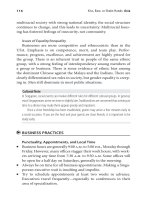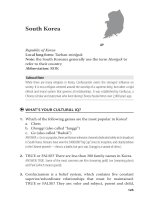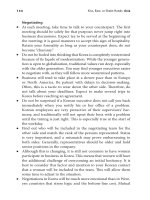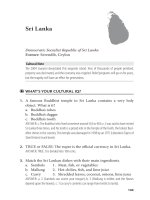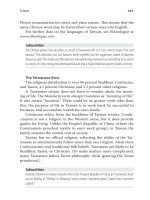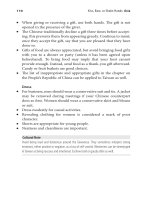How to Do Business in 12 Asian Countries 13
Bạn đang xem bản rút gọn của tài liệu. Xem và tải ngay bản đầy đủ của tài liệu tại đây (140.87 KB, 9 trang )
invites an explanation of the history or origin of titles or names,
providing you with personal information that may be useful.
●
Malaysia is a constitutional monarchy with nine royal houses.
With so many royals, international business visitors are likely to
encounter one sooner or later. Titles and means of address vary;
ask a native how a particular royal should be addressed.
●
Never be overly familiar with a business contact. Most executives
you meet should be addressed with a title and their name. If a per-
son does not have a professional title (such as Engineer, Doctor,
or Teacher), a westerner may use “Mr.” or “Madam/Mrs./Miss”
plus the name. However, be aware that you may be omitting other
titles that are important both to the person and to your under-
standing of that person.
e traditional Malay forms of Mr., Mrs., or Miss are:
Mr. = Encik (which may be abbreviated as “En”)
Mrs. or Madame = Puan
Miss (an unmarried woman) = Cik
ese are used in front of an individual’s name (e.g., Mr.
Ahmadi would be properly addressed as Encik Ahmadi.) Although
there is no Malay equivalent for “Ms.,” the current trend is to use
Puan for any adult female.
●
ere are additional titles that may be used once you become
closer to your Malaysian associates. One title which is important
in business circles is Tuan, which is conferred when a man is in a
respected position of authority.
●
When you ask Malaysian associates about their titles and names,
explain about yours as well. ey may be equally unsure as to
which of your names is your surname. Follow their lead as to the
degree of formality. Don’t tell a Malaysian “just call me Tony”
when you are calling him Dr. Gupta.
●
Each of the three major ethnic groups in Malaysia has dierent
naming patterns. For information on the proper titles and forms of
address for Muslims, Indians, and Chinese, please see Appendix A.
Malaysia
89
90
Kiss, Bow, or Shake Hands: Asia
Cultural Note
As part of the “Vision 2020” plan for Malaysia, an economic center for information technology
(IT) was built, called the Multimedia Super Corridor (MSC). The MSC officially starts at the
Petronas Twin Towers (which were the tallest buildings in the world until they were topped by
a building in Taipei in 2004) and runs for fifty kilometers. It also includes Putrajaya—a largely
commuter-based area for administrative and federal offices, and Cyberjaya, a technology
center.
Gestures
●
Aside from handshakes, there is no public contact between the
sexes in Malaysia. Do not kiss or hug a person of the opposite sex
in public—even if you are husband and wife. On the other hand,
contact between people of the same sex is permitted. Men may
hold hands with men or even walk with their arms around each
other; this is interpreted as nothing except friendship.
●
Among both Muslims and Hindus, the le hand is considered
unclean. Eat with your right hand only. Where possible, do not
touch anything or anyone with your le hand if you can use your
right hand instead. Accept gis and hold cash in the right hand.
(Obviously, when both hands are needed, use them both.)
●
e foot is also considered unclean. Do not move anything with
your feet, and do not touch anything with your feet.
●
Do not show the soles of your feet (or shoes). is restriction
determines how one sits: You can cross your legs at the knee, but
not place one ankle on your knee. However, any form of leg cross-
ing is ostentatiously casual in Malaysia; never cross your legs in
the presence of Malaysian royalty.
●
Do not prop your feet up on anything not intended for feet, such
as a desk.
●
It is impolite to point at anyone with the forenger. Malays use a
forenger only to point at animals. Even pointing with two n-
gers is impolite among many Indians. When you must indicate
something or someone, use the entire right hand (palm out). You
can also point with your right thumb, as long as all four ngers
are curled down. (Make sure all your ngers are curled—older
Malays would interpret a st with the thumb and little nger
extended as an insult.)
●
Pounding one st into the palm of the other hand is considered
obscene.
●
e head is considered the seat of the soul by many Indians and
Malays. Never touch someone’s head, not even to pat the hair of a
child.
●
Among Indians, a side-to-side toss of one’s head indicates agree-
ment, although Westerners may interpret it to mean “no.” Watch
carefully; the Indian head toss is not quite the same as the Western
negative nod (which leads with the jaw).
●
As in much of the world, to beckon someone, you hold your
hand out, palm downward, and make a scooping motion with the
ngers. Beckoning someone with the palm up and wagging one
nger, as in the USA, can be construed as an insult.
●
Standing tall with your hands on your hips—the “arms akimbo”
position—is always interpreted as an angry, aggressive posture.
●
e comfortable standing distance between two people in Malay-
sia varies with each culture. In general, stand as far apart as you
would if you were about to shake hands (about two to three feet).
Indians tend to stand a bit further apart (three or three and a half
feet).
Gifts
●
e Malaysian Anti-Corruption Agency has strict laws against
bribery. Avoid giving gis that could be interpreted as bribes.
●
Gis are exchanged between friends. Do not give a gi to anyone
before you have established a personal relationship with her or
him. Otherwise, the gi may have the appearance of a bribe.
●
It is not the custom to unwrap a gi in the presence of the giver.
To do so would suggest that the recipient is greedy and impatient.
Worse, if the gi is somehow inappropriate or disappointing, both
parties would be embarrassed. Expect the recipient to thank you
briey, then put the still-wrapped gi aside until you have le.
●
Because pork and alcohol are prohibited to observing Muslims,
do not give them as gis to Malays. Other foods make good gis,
Malaysia
91
92
Kiss, Bow, or Shake Hands: Asia
although meat products must be halal (the Muslim equivalent of
kosher). e prohibition against pork and alcohol also precludes
pigskin products and perfumes containing alcohol.
●
Muslim Malays consider dogs unclean. Do not give toy dogs or
gis with pictures of dogs.
●
Remember that personal gis from a man to a woman can be
misinterpreted as romantic oerings.
●
Don’t wrap gis to ethnic Malays in white paper; white is associ-
ated with funerals.
●
e Chinese traditionally decline a gi three times before accept-
ing; this prevents them from appearing greedy. Continue to insist;
once they accept the gi, say that you are pleased that they have
done so.
●
Gis of food are always appreciated by Chinese, but avoid bring-
ing food gis with you to a dinner or party (unless it has been
agreed upon beforehand). To bring food may imply that your host
cannot provide enough. Instead, send food as a thank-you gi
aerward. Candy or fruit baskets are good choices.
●
For further information on Chinese gi-giving practices, see
pages 14–15.
●
Among Indians, the frangipani ower (used by Hawaiians to
make leis) is used only for funeral wreaths.
●
If you give money to an Indian, make sure it is an odd number
(just the opposite of Chinese tradition). Usually this is done by
adding a single dollar; for example, give $11 instead of $10.
●
Observant Hindus do not eat beef or use products made from
cattle. is eliminates most leather products as gis.
Dress
●
Just north of the Equator, Malaysia is hot and humid all year long.
Most of the lowlands have a daytime temperature range of 75 to
95°F and humidity between 60 and 70 percent.
●
Lower temperatures occur only in the mountainous areas, where
businesspeople rarely venture (except for tourism). Mountain
temperatures can actually dip below freezing at night.
●
e monsoon season runs from September through December,
but sudden showers occur all year long. Many people carry an
umbrella every day.
●
As a foreigner, you should dress conservatively until you are sure
what degree of formality is expected. Men should wear a suit
jacket and tie.
●
Because of the heat and humidity, business dress in Malaysia is
sometimes casual. Standard formal oce wear for men is dark
pants and a light-colored long-sleeved shirt and tie, without
a jacket. Businessmen may also wear a short-sleeved shirt with
no tie.
●
Businesswomen wear light-colored long-sleeved blouses and
skirts, or business suits.
●
Many Malaysian men wear an open-necked batik shirt to work.
is is also popular for casual wear. Jeans are acceptable for casual
wear, but shorts should be avoided.
●
In deference to Muslim and Hindu sensibilities, women should
always wear garments that cover at least their upper arms. Skirts
should be knee-length or longer.
Cultural Note
The use of electronic gadgets has become ubiquitous in Asia. Cell phones alone have changed
cultural norms. One unfortunate example is that of a Malaysian football player who terminated
his engagement via a text message the morning of the wedding! The bride then had to face
1,000 guests alone at their traditional Malaysian wedding feast. The incident appalled the
player’s Kedah State Football Association—and all his teammates, who had been invited to
the wedding. Because he tarnished the game’s image, the player’s contract was terminated.
Malaysia
93



